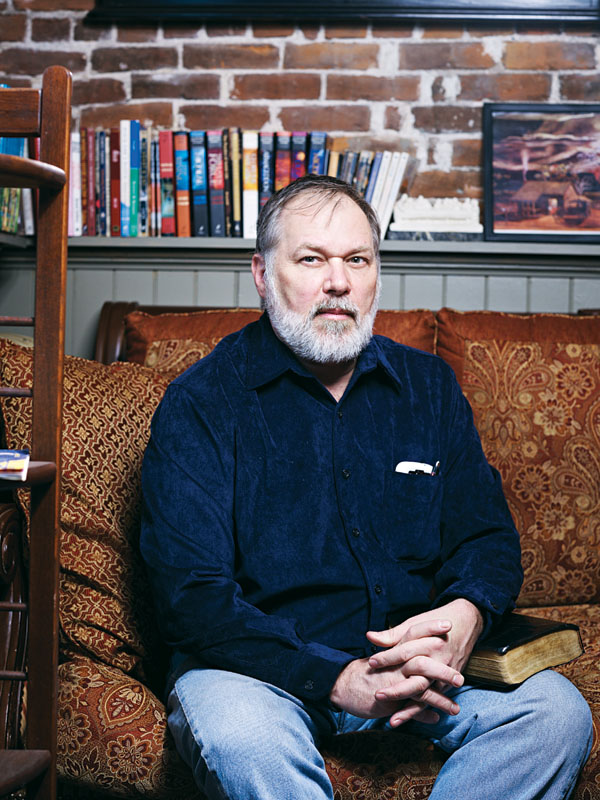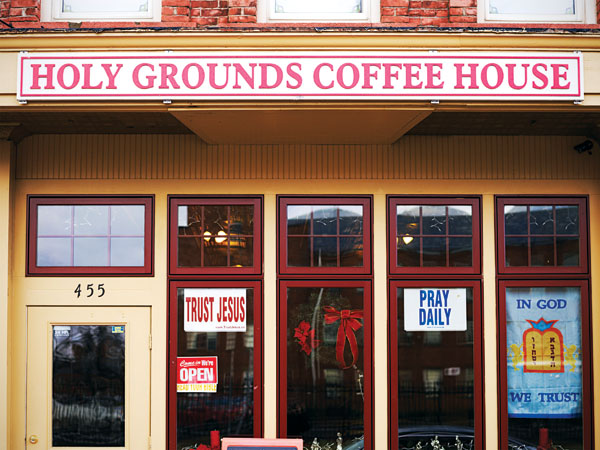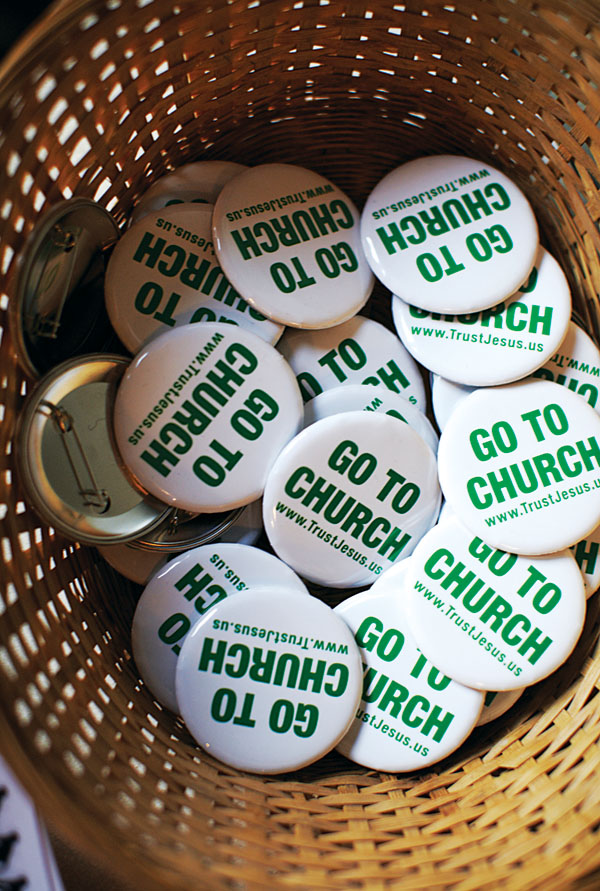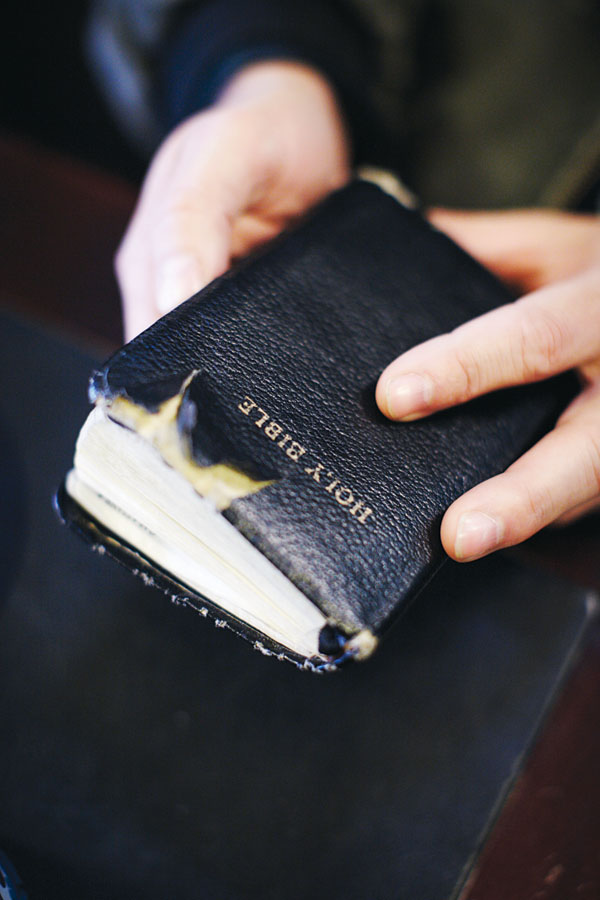Scott Lively: The Crusader

Lively at Holy Grounds with his Bible.
One recent Sunday afternoon, I paid a visit to Lively at Holy Grounds, where each week he delivers a sermon to a small group of followers. I found him there carrying in a box of baked goods and a Crock-Pot of soup to feed his flock after he spoke.
As people trickled in for the sermon, a woman approached Lively to complain that there was no room at a nearby homeless shelter. Used to ministering from a distance on the radio, TV, and at large speaking events, he appeared uncomfortable in this kind of one-on-one encounter, and managed to offer her only awkward platitudes of comfort. “Most people show up later,” he joked to me, “when we get closer to eating time.”
Fifteen minutes after that, Lively mounted a small stage set up in the shop and began delivering his sermon to an audience of about 20 people. He seemed more comfortable. He exuded calm, spoke naturally, and kept his message simple. Always looking for ways to show that the Bible should be interpreted literally, he stood next to a map and cited the recent bombings in Gaza as proof that the Bible had correctly prophesied war in the Middle East. In this sermon, at least, he made no mention of homosexuality.
People kept filtering in as he talked, and by the time he finished, more than 30 were in the audience. I asked one of them, Paul Carvalho, a 48-year-old ex-Marine, what drew him to Lively. “He makes me feel good,” he said. “He is very honest and just tells you to follow the Bible. He doesn’t say you have to be [anti-gay] or you can’t come here. He knows I’m on the fence, but he doesn’t hate gay people, and prays for them, and does everything he can to help people.”
Lively’s work for the poor and homeless in Springfield doesn’t mean that he has abandoned his anti-homosexuality crusade. He has testified against LGBT rights in front of the Massachusetts legislature. He has denounced the state, famously the first in the country to legalize gay marriage, as “the most morally corrupt state in the Union.” He has given talks with such titles as “The Truth about Homosexuality” and “The Global Threat of Homosexuality.” He says that just last year he made some 30 radio appearances and delivered 10 speeches around the country, including one in April, at a Tea Party rally on the Boston Common, where LGBT activists rushed the bandstand area in protest. And he continues to churn out essays and op-ed articles online.
Not surprisingly, a number of Springfield residents worry about having Lively in their midst. The Stop the Hate and Homophobia Coalition, a local social-justice organization, has picketed in front of Holy Grounds on several occasions and helped organize the mass turnout at the federal court hearing in January. “What worries me the most,” says Holly Richardson, the group’s director, “is that other people who he’s influenced will act out and hurt someone. We do not want to drive him out of town, because then he’s someone else’s problem, but our goal is to educate people and try to keep his wings clipped.”
That’s also the goal of the Ugandans who have filed suit against Lively. Whether they will succeed in their efforts is unclear. At the January 7 court hearing, Lively’s lawyers argued that the suit is an attack on Lively’s right to free speech, and as such should be dismissed. At times, the judge appeared to side with Lively, saying that he struggled to see a concrete connection between Lively’s anti-gay advocacy in Uganda and specific acts of persecution committed there against gays. He also noted, however, that the legal standard for dismissing a case is high, and gave no timetable for when he will rule on Lively’s request to toss out the lawsuit.
Lively, for his part, has recently turned over daily operations of Holy Grounds to a local pastor, so that he can focus on his activism. He says he’s negotiating with government officials in several countries, though he would not say which ones, about making speaking tours, and in his newsletter he has begun asking for donations to help his efforts in Massachusetts. He’s 95 percent certain that he’ll run for governor. All of the negative media exposure he’s received since his Uganda trip, he feels, will only help him if he does. “To be blamed for a campaign of hate and violence, when that’s the opposite of what I believe, was really tough,” he says. “And after 20 years of being in this issue, I came out of it with more resolve and more courage. I’ve got skin like a rhinoceros. So now it’s like, ‘Bring it on.’”
As part of the buildup to his run, Lively plans to launch protests at abortion clinics, to speak out against the funding of the “gay agenda” in public schools, to rally Massachusetts conservatives to his cause, and to bring “biblical values” back to the state. “I get to stand for the truth of God,” he says, “at a time when very few people are willing to do it.”
This past November 23, a utility worker in Springfield accidentally punctured a gas line underneath a strip club, injuring more than 20 people. No one was killed, but the blast blew out nearly every window within a three-block radius and damaged 42 buildings. On his blog the next day, Lively wrote that for the past two years he had been praying for the destruction of Satan’s works in Springfield, including strip clubs. And now it had come to pass. “I believe this was the hand of God at work,” he wrote, “in answer to our prayers.”

Holy Grounds, the coffee shop that Lively founded and runs in downtown Springfield, where he moved in 2008 to “re-Christianize” the city.

Some of the buttons that Lively hands out to the poor and homeless in Springfield.



